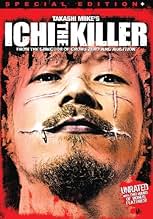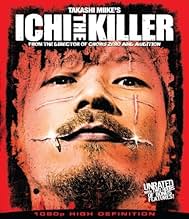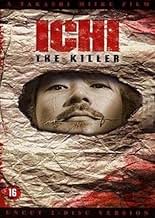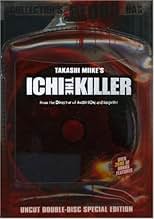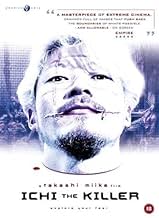CALIFICACIÓN DE IMDb
6.9/10
62 k
TU CALIFICACIÓN
Mientras el matón sadomasoquista de los yakuza, Kakihara, busca a su jefe desaparecido, se encuentra con Ichi, un asesino psicótico y reprimido que puede infligir niveles de dolor que Kakiha... Leer todoMientras el matón sadomasoquista de los yakuza, Kakihara, busca a su jefe desaparecido, se encuentra con Ichi, un asesino psicótico y reprimido que puede infligir niveles de dolor que Kakihara solo ha soñado lograr.Mientras el matón sadomasoquista de los yakuza, Kakihara, busca a su jefe desaparecido, se encuentra con Ichi, un asesino psicótico y reprimido que puede infligir niveles de dolor que Kakihara solo ha soñado lograr.
- Dirección
- Guionistas
- Elenco
- Premios
- 6 premios ganados y 4 nominaciones en total
- Dirección
- Guionistas
- Todo el elenco y el equipo
- Producción, taquilla y más en IMDbPro
Opiniones destacadas
Be warned - as early as the film's titles - letters rising from fallen sperm - (The costumed killer ejaculated voyeuristically watching violence done by one of the other team of gangster killers). You should either run screaming from the theater or stay for an over-the-top exercise in so much violence it becomes white noise and almost disappears. Seen at the Cinematheque, here in Los Angeles, with an adult crowd - this unrated but surely X-cubed film was a delight to those who stayed A few patrons fled in the middle of the screening but most got the point. Bad guys pursuing bad guys - with genre formula being trashed at every point - the humor built and built. Any good characters (children included) were decimated or tortured. None were spared. Yet the film is a romp - from the complaining co-workers who grumble about having to clean up blood-drenched murder scenes (they found intestines everywhere) to the sado-masochistic special effects. The film has left turns into fantasy - then back again - it has intentional bad-acting scenes (from previously capable actors)- the camera work has a will of it sown - exposition that makes no sense.
This film posits the questions: If you are going to be a bad-boy film director and take screen violence as far as it can go - no farther than that - NO REALLY FARTHER THAN THAT - to the point of blood almost every minute - what would the result be? Apparently the director feels that on the far side of excess violence and blood letting in glorious technicolor and grotesque special effects, the cinema would revert to a twisted sense of innocence (beyond all that killing there is a comic sense of the universe).
A film that should be seen - but you should be prepared for it. Not a classic - but a definite statement - more a cinema-artist's statement than a traditional film. Museums will find a place for it - families will abhor it.
I got into it to my amazement. It stretched my mind about what should be so.
This film posits the questions: If you are going to be a bad-boy film director and take screen violence as far as it can go - no farther than that - NO REALLY FARTHER THAN THAT - to the point of blood almost every minute - what would the result be? Apparently the director feels that on the far side of excess violence and blood letting in glorious technicolor and grotesque special effects, the cinema would revert to a twisted sense of innocence (beyond all that killing there is a comic sense of the universe).
A film that should be seen - but you should be prepared for it. Not a classic - but a definite statement - more a cinema-artist's statement than a traditional film. Museums will find a place for it - families will abhor it.
I got into it to my amazement. It stretched my mind about what should be so.
Wow, I certainly didn't know what was waiting for me when I decided to watch this movie... I'd like to think I'm generally hardened, I like horror video games, movies, even read some mangas like Berserk and Junji Ito's horror mangas but wow this movie was a bit too much for me.
Never have I seen such a divisive public when it comes to a movie like this, some people don't like it and some people praise it. I really understand both sides. In fact I first came to know about this movie through a book called "1001 Movies to see before you die" and this movie was amongst them, I really don't remember what was the reasoning for it being there but I can understand in some sense why. This movie is relentless, like every scene that you expect the director to not show the explicitness the director shows it- sometimes I wonder if such violence is needed? Perhaps as a means to not deter from the original vision of where it came from I.e. A manga? With drawings you can stylise violence, make it into a part of the aesthetic of your story and I think that Takashi Miike wanted to do something similar with this and show everything just like in the mangas. Honestly one would believe the scenes involving the titular Ichi would be the most terrible ones because he commits the most gruesome murders ever but since his character and his suit and the way he kills his victims are done in such an overblown cartoonish way it is hard to show it done without it looking very fake with CGI and stuff, unless you want to spend a lot on practical effects which Takashi doesn't so most of the killings Ichi does luckily are mostly implied or not shown a lot in contrast to Kakihara who does drawn out painful torture scenes, these were the ones that I wanted to look away from and had to cover my eyes even! Never have I ever encountered something like this before. It is also interesting how it tries to show different sides of violence from different points of view, both equally brutal.
Violence aside I think this movie oozes style, it has cool camera placements and editing that is really frantic... but I think this film excels the most in how it captures it's characters, the costuming is brilliant- Kakihara's wardrobe is so bright and colourful which is a joy to watch (who's the designer?), same with everyone else on the cast, it is a joy (but also a fright) to see everyone imbue their characters with such effervescence.
A negative of this movie I guess is that the story isn't conveyed really well? Some plot points, motivations and relationships in characters weren't done well enough- which is also the difficulty in adapting a manga to a live action movie cause in the manga you'll always have the advantage of having pages and pages to develop everything. I had to read a summary just to understand what was going on and why some characters did some stuff in the movie. This is also a negative side of the hyperactive and stylistic cutting of the movie, sure it looks very cool but it might confuse more than lead on. Also the ending is a bit confusing, make sure to read the wiki to understand it lol! But as I understood it it's a cycle of violence that repeats itself and that revenge never pays no matter how you do it.
Would I watch this movie again? I don't think so really, maybe look at images of the characters to take inspiration for costuming and such but otherwise I couldn't stomach it- even watching it this time I had to take breaks from watching it and cuddle with my dog before I could see the rest of it. Make sure to watch this with someone because going at it alone is not something I recommend. It made me feel and that is what art is supposed to do, it wasn't pleasant feelings but nevertheless it made me feel, and for that I applaud it. Takashi Miike is brave for doing this but I certainly hope that I won't have to watch anything like it again cause wow this was certainly something different. As I said, I understand why it is appreciated but I also understand why it is hated.
Never have I seen such a divisive public when it comes to a movie like this, some people don't like it and some people praise it. I really understand both sides. In fact I first came to know about this movie through a book called "1001 Movies to see before you die" and this movie was amongst them, I really don't remember what was the reasoning for it being there but I can understand in some sense why. This movie is relentless, like every scene that you expect the director to not show the explicitness the director shows it- sometimes I wonder if such violence is needed? Perhaps as a means to not deter from the original vision of where it came from I.e. A manga? With drawings you can stylise violence, make it into a part of the aesthetic of your story and I think that Takashi Miike wanted to do something similar with this and show everything just like in the mangas. Honestly one would believe the scenes involving the titular Ichi would be the most terrible ones because he commits the most gruesome murders ever but since his character and his suit and the way he kills his victims are done in such an overblown cartoonish way it is hard to show it done without it looking very fake with CGI and stuff, unless you want to spend a lot on practical effects which Takashi doesn't so most of the killings Ichi does luckily are mostly implied or not shown a lot in contrast to Kakihara who does drawn out painful torture scenes, these were the ones that I wanted to look away from and had to cover my eyes even! Never have I ever encountered something like this before. It is also interesting how it tries to show different sides of violence from different points of view, both equally brutal.
Violence aside I think this movie oozes style, it has cool camera placements and editing that is really frantic... but I think this film excels the most in how it captures it's characters, the costuming is brilliant- Kakihara's wardrobe is so bright and colourful which is a joy to watch (who's the designer?), same with everyone else on the cast, it is a joy (but also a fright) to see everyone imbue their characters with such effervescence.
A negative of this movie I guess is that the story isn't conveyed really well? Some plot points, motivations and relationships in characters weren't done well enough- which is also the difficulty in adapting a manga to a live action movie cause in the manga you'll always have the advantage of having pages and pages to develop everything. I had to read a summary just to understand what was going on and why some characters did some stuff in the movie. This is also a negative side of the hyperactive and stylistic cutting of the movie, sure it looks very cool but it might confuse more than lead on. Also the ending is a bit confusing, make sure to read the wiki to understand it lol! But as I understood it it's a cycle of violence that repeats itself and that revenge never pays no matter how you do it.
Would I watch this movie again? I don't think so really, maybe look at images of the characters to take inspiration for costuming and such but otherwise I couldn't stomach it- even watching it this time I had to take breaks from watching it and cuddle with my dog before I could see the rest of it. Make sure to watch this with someone because going at it alone is not something I recommend. It made me feel and that is what art is supposed to do, it wasn't pleasant feelings but nevertheless it made me feel, and for that I applaud it. Takashi Miike is brave for doing this but I certainly hope that I won't have to watch anything like it again cause wow this was certainly something different. As I said, I understand why it is appreciated but I also understand why it is hated.
Ichi (Nao Omori) is a disturbed and brainwashed killing machine who dresses up in a superhero costume and is controlled by his mentor named Jijii (Shinya Tsukamoto).
Kakihara (Asano Tadanobu) is a sadistic gangster who loves three things: giving and being given pain and looking for the killing machine named Ichi, the person who killed his boss and ran away with his three-hundred million yen. His quest with looking for the mysterious Ichi causes the streets to become a battleground with the gangs of Shinjuku. As the film goes by, the battle with the gangs of Shinjuku becomes more gory than ever.
ICHI THE KILLER is a rare film that we get these days. It contains good cartoon like violence, humour so black yet it would make people laugh, an awesome soundtrack and great makeup effects. Sure, it may not be for everyone but for those that are open-minded or are Miike fans and want to watch something different, this film would be for them.
Kakihara (Asano Tadanobu) is a sadistic gangster who loves three things: giving and being given pain and looking for the killing machine named Ichi, the person who killed his boss and ran away with his three-hundred million yen. His quest with looking for the mysterious Ichi causes the streets to become a battleground with the gangs of Shinjuku. As the film goes by, the battle with the gangs of Shinjuku becomes more gory than ever.
ICHI THE KILLER is a rare film that we get these days. It contains good cartoon like violence, humour so black yet it would make people laugh, an awesome soundtrack and great makeup effects. Sure, it may not be for everyone but for those that are open-minded or are Miike fans and want to watch something different, this film would be for them.
Takashi Miike's "Ichi the Killer" is a masterpiece of insane cinema.This film is surely challenging-filled with enough sadistic violence and rape to satisfy fans of Japanese harrowing cinema.It's based on the popular manga by Hideo Yamamoto.The character of Ichi is truly amazing-he is a mysterious figure who slices various individuals into numerous bloody pieces with razor sharp blades strapped to his boots.The gore is pretty extreme as Ichi literally slices people in half with his razor-sharp boots.The acting is surprisingly good-Nao Omori and Tadanobu Asano are impressive as Ichi and Kakihara.Highly recommended,especially if you have strong stomach.9 out of 10.
Ichi the Killer is the story of a Yakuza gang run by Anjo, whom his underlings find missing (possibly killed) with 100 million yen gone as well. The functional head of Anjo's gang while he's absent is an off-the-wall sadomasochist named Kakihara (Tadanobu Asano). There is a former affiliate gang, now somewhat rivals, run by Fujiwara (Toru Tezuka), and there are a number of gang outcasts who hang out at a bar/brothel, with Jijii (Shinya Tsukamoto) as their head. Jijii is manipulating/grooming a bizarre killer named Ichi (Nao Omori), who is gradually taking out Anjo and Fujiwara gang members for him.
If you haven't seen infamous Japanese cult film director Takashi Miike's Ichi the Killer yet and you're considering it, there is one "test" that might make the decision easy for you--do you like fairly regular over-the-top violence, torture and gore? If that's enough to turn you on to a film, do not pass Ichi the Killer up--you're sure to love it. This is one of the most brutal and gory films I've seen, and yes, I've seen Andreas Schnaas films. However, if those things are enough to turn your stomach instead, you shouldn't come near this film with a two-foot needle.
For me, I don't mind over-the-top violence, torture and gore, but that in itself isn't sufficient for me to like a film. Despite some admirable stylistic flourishes, including some very unique cinematography and editing as well as an unusual but extremely effective soundtrack, there were a number of things in Ichi the Killer that didn't quite work for me. I ended up liking the film, but just moderately. A 7 is a "C" in my rating system.
One problem I had with the film, which might be clear from the description in my first paragraph, is that the plot isn't exactly easy to follow. Writer Sakichi Satô, adapting the script from a manga (Japanese comic) by Hideo Yamamoto, introduces a large number of characters in each scene, and we do not always get their names or very clear dialogue explaining who they are. There were quite a few characters for whom I was never very sure about their identity. In conjunction with this, the film didn't always flow as well as it should have. It tends to feel like long scenes of establishing exposition alternated with violence/torture showcases.
But by the final "act", there are some very interesting revelations about characters and their relationships to one another. So it's not that the kernel of a good story isn't there. It's just told a bit awkwardly. This might not have been helped by the fact that Miike has stated that he was shooting for a kind of open-ended vagueness that is characteristic of Asian genre films. The impact of the revelations is somewhat dissolved by the time we get to the dénouement due to the intentional ambiguity.
The beginning of Ichi the Killer employs a lot of extended cinematographic techniques in rapid succession ala Oliver Stone--different film speeds, stocks, tinting and processing methods, and so on. While these are interesting, Miike forgets about them quickly as he works his way into the story. They pop up occasionally later in the film, as do a couple shots in the vein of Dario Argento, such as a tracking shot through someone's ear. Even when more conventional, the cinematography and production design remain admirable throughout--I particularly liked the shot of Kakihara sitting in front of a red background, with his purple coat and green scarf, but there is a lot of outstanding visual composition in the film.
Whether intended or not, Ichi the Killer frequently reads as more of a black (morbid) comedy. This is because the violence is so over-the-top that it is frequently cartoonish and ridiculous. Those are positive qualities in my book, but anyone looking for realism should beware. On the other hand, the emotional reactions from "victims" are fairly realistic throughout the film, including the fact that people do not die immediately after they are injured.
But Miike's concern, as with his other films, is more surrealist. The behavior of the principal characters is particularly wacky, especially Ichi, who often seems borderline mentally deficient--he cries and cowers before he brutally attacks his victims, and has a very odd sexual dysfunction associated with his violence. Ichi is also portrayed as something akin to a superhero, and Miike constantly bounces back and forth between showing him as an admirable vigilante and an anti-hero. Kakihara, who is giving something of a venerable "bad boy" rock star/punk persona, is also almost a hero through much of the film, and he also has some bizarre sexual dysfunctions, as do a number of other characters. This is one of the main subtexts of the film; it isn't entirely dissimilar to the later A Snake of June (2002). There is also another character who undergoes something of a superhero transformation, as he sheds his public appearance and becomes a muscle-bound avenger near the climax.
If you haven't seen infamous Japanese cult film director Takashi Miike's Ichi the Killer yet and you're considering it, there is one "test" that might make the decision easy for you--do you like fairly regular over-the-top violence, torture and gore? If that's enough to turn you on to a film, do not pass Ichi the Killer up--you're sure to love it. This is one of the most brutal and gory films I've seen, and yes, I've seen Andreas Schnaas films. However, if those things are enough to turn your stomach instead, you shouldn't come near this film with a two-foot needle.
For me, I don't mind over-the-top violence, torture and gore, but that in itself isn't sufficient for me to like a film. Despite some admirable stylistic flourishes, including some very unique cinematography and editing as well as an unusual but extremely effective soundtrack, there were a number of things in Ichi the Killer that didn't quite work for me. I ended up liking the film, but just moderately. A 7 is a "C" in my rating system.
One problem I had with the film, which might be clear from the description in my first paragraph, is that the plot isn't exactly easy to follow. Writer Sakichi Satô, adapting the script from a manga (Japanese comic) by Hideo Yamamoto, introduces a large number of characters in each scene, and we do not always get their names or very clear dialogue explaining who they are. There were quite a few characters for whom I was never very sure about their identity. In conjunction with this, the film didn't always flow as well as it should have. It tends to feel like long scenes of establishing exposition alternated with violence/torture showcases.
But by the final "act", there are some very interesting revelations about characters and their relationships to one another. So it's not that the kernel of a good story isn't there. It's just told a bit awkwardly. This might not have been helped by the fact that Miike has stated that he was shooting for a kind of open-ended vagueness that is characteristic of Asian genre films. The impact of the revelations is somewhat dissolved by the time we get to the dénouement due to the intentional ambiguity.
The beginning of Ichi the Killer employs a lot of extended cinematographic techniques in rapid succession ala Oliver Stone--different film speeds, stocks, tinting and processing methods, and so on. While these are interesting, Miike forgets about them quickly as he works his way into the story. They pop up occasionally later in the film, as do a couple shots in the vein of Dario Argento, such as a tracking shot through someone's ear. Even when more conventional, the cinematography and production design remain admirable throughout--I particularly liked the shot of Kakihara sitting in front of a red background, with his purple coat and green scarf, but there is a lot of outstanding visual composition in the film.
Whether intended or not, Ichi the Killer frequently reads as more of a black (morbid) comedy. This is because the violence is so over-the-top that it is frequently cartoonish and ridiculous. Those are positive qualities in my book, but anyone looking for realism should beware. On the other hand, the emotional reactions from "victims" are fairly realistic throughout the film, including the fact that people do not die immediately after they are injured.
But Miike's concern, as with his other films, is more surrealist. The behavior of the principal characters is particularly wacky, especially Ichi, who often seems borderline mentally deficient--he cries and cowers before he brutally attacks his victims, and has a very odd sexual dysfunction associated with his violence. Ichi is also portrayed as something akin to a superhero, and Miike constantly bounces back and forth between showing him as an admirable vigilante and an anti-hero. Kakihara, who is giving something of a venerable "bad boy" rock star/punk persona, is also almost a hero through much of the film, and he also has some bizarre sexual dysfunctions, as do a number of other characters. This is one of the main subtexts of the film; it isn't entirely dissimilar to the later A Snake of June (2002). There is also another character who undergoes something of a superhero transformation, as he sheds his public appearance and becomes a muscle-bound avenger near the climax.
¿Sabías que…?
- Trivia(at around 18 mins) For the sequence based on the part in the manga during chapters 13-16 of volume 2, where a naked Susuki of the Funakigumi is tortured by being suspended from meat-hooks. Susuki's actor Susumu Terajima required twelve hours of makeup and other preparation, and then spent twelve more hours shooting the scene.
- Errores(at around 1h 30 mins) When Kakihara is attacked in the streets, protective padding is visible under his clothing. Look for it when he bends over backwards without falling over, before he removes his piercings.
- Créditos curiososEnd credits scroll up, down, left, right, forwards and backwards.
- Versiones alternativasThe French DVD is the full uncut version
- ConexionesFeatured in The Cult of Ichi (2007)
Selecciones populares
Inicia sesión para calificar y agrega a la lista de videos para obtener recomendaciones personalizadas
Detalles
Taquilla
- Presupuesto
- USD 1,400,000 (estimado)
- Total en EE. UU. y Canadá
- USD 20,285
- Fin de semana de estreno en EE. UU. y Canadá
- USD 2,750
- 12 nov 2017
- Total a nivel mundial
- USD 80,631
Contribuir a esta página
Sugiere una edición o agrega el contenido que falta

Principales brechas de datos
What is the streaming release date of Ichi el asesino (2001) in Australia?
Responda

